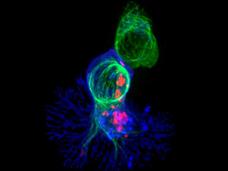Cancer Currents: An NCI Cancer Research Blog
A blog featuring news and research updates from the National Cancer Institute. Learn more about Cancer Currents.
-
Drug Combination Improves Outlook for Some Patients with Chronic Lymphocytic Leukemia
Interim results from an ongoing clinical trial show that patients with relapsed or refractory chronic lymphocytic leukemia treated with rituximab plus venetoclax have longer progression-free survival compared with patients treated with chemotherapy.
-
Unique Trial Aims to Decrease Early Deaths in Patients with Rare Leukemia
In a unique clinical trial, a group of oncologists with experience treating acute promyelocytic leukemia are making themselves available around the clock to help clinicians at hospitals across the country treat their APL patients.
-
Fusobacterium May Help Colorectal Cancer Grow and Spread
Fusobacterium, found in the stomach and intestines, may help fuel the growth of colorectal cancer and metastases. In a mouse model of colorectal cancer, using antibiotics to kill these bacteria slowed tumor growth.
-
Genomic Profiling Tests Cleared by FDA Can Help Guide Cancer Treatment, Clinical Trial Enrollment
The FDA has recently approved two tests to identify genetic alterations in tumors. One of the tests can be used to identify patients who may be candidates to receive specific targeted therapies.
-
Brentuximab Vedotin Approved for Two Rare Lymphomas
FDA has approved brentuximab vedotin (Adcetris®) for the treatment of adults who have been treated previously for either primary cutaneous anaplastic large cell lymphoma or CD30-expressing mycosis fungoides, two rare lymphomas that start as rashes on the skin.
-
NCI: Taking Risks to Advance Science
Norman Sharpless, M.D., offers his thoughts on his experience thus far as NCI director and areas, like big data, where NCI can play an important role in advancing science.
-
Prior Cancers Common in Patients Newly Diagnosed with Cancer
A new study shows that many patients diagnosed with a new cancer have had one or more cancers in the past, which has potential implications for long-term surveillance and clinical trial enrollment.
-
Acalabrutinib Receives FDA Approval for Mantle Cell Lymphoma
The FDA has granted accelerated approval to acalabrutinib (Calquence®) for the treatment of adults with mantle cell lymphoma whose cancer has progressed after receiving at least one prior therapy.
-
With Advances in Cancer Immunotherapy, Scientists Discuss Need to Develop New Mouse Models
A recent NCI symposium focused on developing new and better mouse models for testing treatments that harness the immune system against cancer.
-
FDA Approves Alectinib For Initial Treatment of ALK-Positive Lung Cancer
FDA has approved alectinib (Alecensa) as a first-line treatment option for patients with advanced non-small cell lung cancer that is ALK positive. Alectinib is the third ALK inhibitor to be approved in this setting.
-
Fat Cells May Hinder Effectiveness of Chemotherapy
Researchers have shown that fat cells can absorb two commonly used chemotherapy drugs and break them down chemically into a less toxic form, potentially reducing the drugs’ effectiveness.
-
Expanding Cancer Clinical Trial Access for Patients with HIV
People with HIV are often excluded from clinical trials to protect their safety. Preliminary results from an NCI-sponsored study of an immunotherapy drug show that people with HIV can safely participate in clinical trials.
-
Dasatinib Approved by FDA for Some Children with Chronic Myelogenous Leukemia
On November 9, the FDA approved dasatinib (Sprycel®) for the treatment of children with chronic myelogenous leukemia (CML) whose cancer cells express the Philadelphia chromosome and whose disease is in a relatively early stage, known as the chronic phase.
-
An Important Moment in Tobacco Control
November 26, 2017, marked a unique moment in US public health history, with the major US tobacco companies issuing the first in a series of court-ordered "corrective statements" about their products.
-
Expanding Smoking Cessation Services at NCI-Designated Cancer Centers: An Interview with Dr. Glen Morgan
NCI’s Dr. Glen Morgan discusses NCI’s Cancer Center Cessation Initiative, including how and why this smoking cessation initiative was developed and its long-term goals.
-
Endometrial Cancer Incidence Rising in the US and Worldwide
Diagnoses of endometrial cancer have increased worldwide in recent years, with rates rising in more than half of the 43 countries studied during the decade ending around 2010, a team of international researchers has shown.
-
Experimental Ovarian Cancer Vaccine Shows Promise in Mice
The experimental vaccine targets a protein found at elevated levels in about 90% of the most common type of ovarian cancer. If validated in human studies, researchers believe the vaccine may be particularly useful for women who carry BRCA1 and BRCA2 gene mutations.
-
Many Ovarian Cancers May Start in Fallopian Tubes, Study Finds
A new study provides more evidence that the most common form of ovarian cancer may originate in the fallopian tubes, and that there is a window of nearly 7 years between development of fallopian tube lesions and the start of ovarian cancer.
-
Alternate Driver of Treatment-Resistant Prostate Cancer Identified
Researchers have identified an emerging subtype of metastatic prostate cancer that is resistant to therapies that block hormones that fuel the disease.
-
Study Identifies Potential Drug Combination for Ewing Sarcoma
From experiments in cells and mice, researchers have identified a two-drug combination that kills more Ewing sarcoma cells than either drug on its own. The study findings could help inform future clinical trials.




















